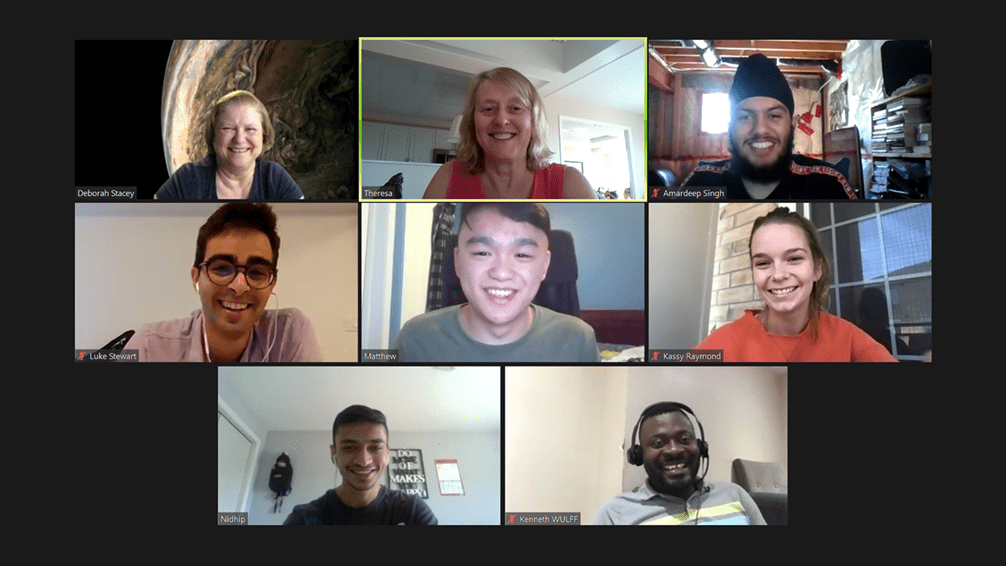Dr. Theresa Bernardo

I’ve worked in health informatics my entire career. Before it had that title. And now we have a name for it, although people still wonder what it is. It’s anything to do with health and computing.
Dr. Bernardo
Years ago, Dr. Theresa Bernardo received a call from a colleague in the Caribbean asking about the safety of live animal imports from Europe. Little did she know that answering that request would lead to the launch of a multi-lingual database and mapping system to track the global spread of animal diseases.
At the time, Dr. Bernardo was working as an epidemiologist on the Caribbean Animal and Plant Health Information Network, a joint project of the Canadian International Development Agency (subcontracted to the University of Guelph) and the Inter-American Institute for Cooperation on Agriculture (IICA). Many small island countries had just one veterinarian, so to promote better connectivity, she and a multi-disciplinary, multi-institutional team created the information network and put the first computers in the Ministries of Agriculture in 14 countries, from 1988 to 1991.
They also developed and distributed software to analyze, visualize, and process data on the spread and economic impact of animal and plant diseases, particularly through livestock and agriculture trade. This line of work that combines health data and information technology has come to be known as health informatics.
“I’ve worked in health informatics for my entire career,” says Bernardo. “I started before it even had that title.”
It followed then that Bernardo’s name would be mentioned at one of the earliest meetings for the Global Burden of Animal Diseases Programme (GBADs). The programme is a global initiative with leadership from the University of Liverpool and the World Organization for Animal Health in Paris that aims to identify and document the prevalence and economic burden of animal diseases in areas across the globe.
GBADs is divided into eight themes (akin to task forces) and Bernardo, now a faculty member at the Ontario Veterinary College, leads the Informatics Theme with University of Guelph colleague Prof. Deborah Stacey from the School of Computer Science. Rather than storing data in a centralized manner, the team plans to develop best practices for accessing existing data about animal disease from various countries and sources, including local, national, and regional producers, governments, and organizations in the private sector. They will then allow users to analyze and visualize that data in various ways. The Informatics Theme works in conjunction with the other GBADs themes to identify and gain access data that is stored and updated by other organizations.
Bernardo hopes the community using the data will continue to grow over time – after all, in an increasingly connected world facing so many global issues, sharing data is an important part of combating plant, animal and human health issues.
“Sharing data more widely has allowed scientific advances to increase at an incredible pace.” Says Bernardo.
Bernardo not only recognizes the importance of collaboration in data gathering but sees a need for collaborative approaches to large-scale problems like that of disease spread. COVID-19 is a classic example. One Health – that is, the interconnectedness of human, animal, and environmental health – is exactly that type of approach and one that is embedded in the GBADs Programme. Though their main focus in on animals, there are similar initiatives in human and environmental health, which together could comprise One Health Data.
Bernardo and the Informatics Theme will be working primarily with data, yes, but that data will come from people and cultural contexts different from their own. As such, significant effort must go into handling and utilizing data in an ethical and secure way. Bernardo stated that the process will be just as important as any outputs.
“As the Informatics leads,” says Bernardo, “we’re hoping to set a precedent in terms of managing both open and private data that will allow us to bring data together across human, animal, and environmental health.”
The GBADs Programme is funded by the Gates Foundation.
Read more about the Programme and Dr. Bernardo’s role in it at their website: https://animalhealthmetrics.org/
By: Anna McMenemy
Share this article




